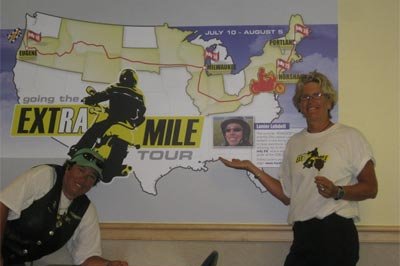When Lanier Lobdell learned she had rheumatoid arthritis two decades ago, she feared the daily pain she experienced would prevent her from reveling in her favorite mode of transportation — her prized motorcycle.
But, earlier this month, the openly gay Eugene, Ore., resident set off on her Honda Valkyrie on a trip that would take her across the country, raising awareness about the disease and giving hope to those who were in the same desperate situation she was in 20 years ago.
Lobdell’s “Going the Extra Mile Tour” made a stop July 22 in Horsham at the Centocor Ortho Biotech office, a company that has been key to getting her back on her feet and her bike.
Lobdell, 55, a native of Manhattan who was raised in Monmouth County, N.J., first learned she had RA after a motorcycle trip to a women’s festival.
“I couldn’t move my shoulder at all and was in excruciating pain and then it started to go down into my feet and I couldn’t walk,” she said. “The person I was with was a nurse and she knew right away what was going on, and when I got home, I got in to see a rheumatologist and that was that.”
RA is an autoimmune disorder that attacks the joints, causing inflammation and disfiguring nodules and affecting more than 1 million Americans.
“I wasn’t able to do anything. It hit me pretty hard very fast,” Lobdell said. “It was pretty much debilitating. My wrists were crooked, my hands were crooked and fatigue was a big part of it. I was just in amazing pain every day.”
Lobdell eventually had to sell her BMW motorcycle, which sat dusty in her garage for years because the constant pain, along with her hand and wrist changes, made it difficult to ride.
She said she tried medication after medication, but wasn’t able to find anything that was successful.
About 10 years ago, however, she learned of a new biologic called Remicade and decided to give it a try.
The product, created by Centocor, involves an IV infusion every eight weeks, which Lobdell said gave her instant relief.
After her diagnosis, Lobdell had to cut her hours back as a bus driver for the public-transit system in Eugene, and about 10 years ago she moved over to the customer-service department, where she now is back to a full-time schedule.
After seven years of not being able to ride, Lobdell purchased the new Valkyrie and has been riding it since, with modifications made to the handlebars.
She said the idea for the tour — the longest motorcycle trip she’s ever taken — began germinating during a trip last year.
“I was riding last year and, you have a lot of time to think when you’re on a motorcycle, and I was thinking that without the Remicade I’d be home. And I thought, Hey, I want to make a bumper sticker that says that. So I called [Centocor] for the trademark issues and everything and then it just took off from there, with us having a conversation about how my story is so interesting and it’s something that should be told. It ballooned into this as a way for me to get this message out there: that I do have RA but I’m able to ride and do what I love to do.”
Her tour kicked off from her partner’s newly opened restaurant in Eugene July 10, and also made a stop in Milwaukee for a meeting with the Wisconsin chapter of the Arthritis Foundation, an agency she said has been a big supporter of her efforts. While she was in Horsham, the Eastern Pennsylvania chapter of the organization held a luncheon in her honor, before Lobdell set off for her final destination of Portland, Maine.
Lobdell and her friend Flaxen Conway have been riding 10 or 11 hours per day and spending nights in hotels. Apart from the organized awareness-raising events along the route, Lobdell has also had the chance to explain her mission to everyday people they encounter.
“People have been stopping us at gas stations because they see our bags and our Oregon plates and ask where we’re coming from and what we’re doing,” she said.
In all of her interactions, Lobdell said she hopes to inspire people with RA or those who have loved ones with the disease that relief is possible.
“You can’t give up,” she said. “You have to be your own advocate. You have to keep talking to your doctor, and if one medication isn’t working then you have to try something else. When I was first diagnosed, there weren’t many choices and the medications were pretty limited, but it’s gotten so much better now. You just can’t give up.”
Jen Colletta can be reached at [email protected].
